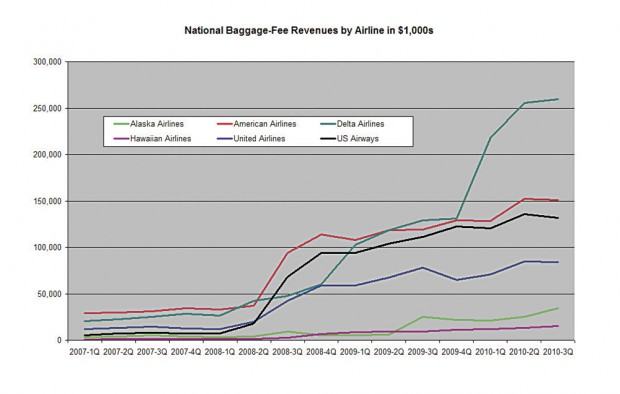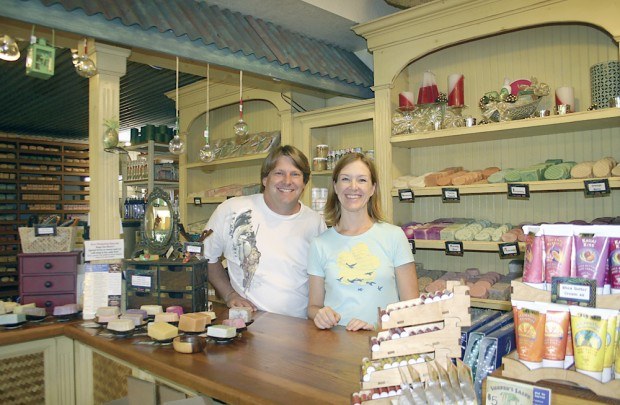LIHU‘E – Tourists visiting Island Soap and Candle Works boutique in Old Koloa Town are making purchasing decisions based upon TSA baggage restrictions and airline baggage fee policies, store managers say. “People are seriously concerned about the fees,” retail merchandising
LIHU‘E – Tourists visiting Island Soap and Candle Works boutique in Old Koloa Town are making purchasing decisions based upon TSA baggage restrictions and airline baggage fee policies, store managers say.
“People are seriously concerned about the fees,” retail merchandising manager Amy Winters said. “I can hear them talking to each other about it when they browse around the shop.”
While airlines have grossed approximately $3 billion in revenues this year for checked luggage, and TSA continues tight restrictions for carry-on bags, some souvenir shops and touristy retailers have experienced the unintended consequences of lost sales.
“When weight limits were imposed on luggage, we noticed a big difference in sales,” Winters said. “We figured we’ve got to do something.”
They tried encouraging shoppers to ship purchases by throwing in free products, but it didn’t do much good. Then they offered free shipping.
“We really ate it on that idea,” she said.
Then they started using the US Postal Service’s flat-rate Priority Mail boxes and began offering customers shipping for $10 on purchases over $100. “The flat-rate boxes made all the difference in the world,” she said. During the last month, sales for shipping have increased 11 percent.
At Aunty Lilikoi’s, which offers jarred mustards, jams, syrups and dressings, about half of all sales are shipped, says manager Lori Cardenas.
“We created products to fit flat-rate boxes,” she said. “Baggage fees are a concern, but it’s one of those things that if people really want it, they’ll get it no matter what. You find ways to work around it.”
Items’ size and weight continues to be a challenge for some. “We purposely made 3-ounce tubes of lotions, bath salts and body butters for the TSA carry-on liquids requirement,” Winters said.
One shopper passed up an offer for two free bars of soap when she purchased three because she was afraid they wouldn’t fit into her carry-on bag, Winters said.
One in four passengers doesn’t check luggage in order to avoid baggage charges, down from one in six two years ago, reported CBS News earlier this year.
“Just last week, a girl wanted to buy four jars of our body butter but realized she couldn’t take it on the plane,” and they lost the sale, Winters said.
“Liquids are a big issue for carry-ons and soap is just heavy,” she said. “Chapstick sales are up not just because it has a low price point, but because they can carry it on the plane.”
Some people ask Winters to weigh items they’re considering buying before purchasing them.
How much of a hit retailers have taken is difficult to quantify, because most airlines began imposing fees during the recession in 2008.
“Things have slowed down over the last couple of years,” said Leona Lemn, sales associate at Island Fever, a souvenir shop in Coconut Marketplace.
“I’m sure the fees have something to do with it, but I also attribute it to the slow down to the economy.”
What is clear is many retailers are continuing to scale down the size of their products, as well as offering shipping to encourage sales.
“Shipping has picked up a lot,” said Lemn. “We are carrying smaller lotions, because it’s so sad to see people have to give away their purchases at the airport.”
Consumer Travel Alliance, a nonprofit consumer advocacy group, estimated that American travelers spent $167 million in extra airline fees during the Thanksgiving holiday.
United Airlines baggage fees each way are $25 for the first checked bag, $30 for the second, and a 50 pound limit is required. Excede the weight limit and the airline will tack $100 on to their fee.
Winters says people seem to like the convenience of shipping, and their aggressive merchandising efforts “have helped stop the economic bleeding.”



